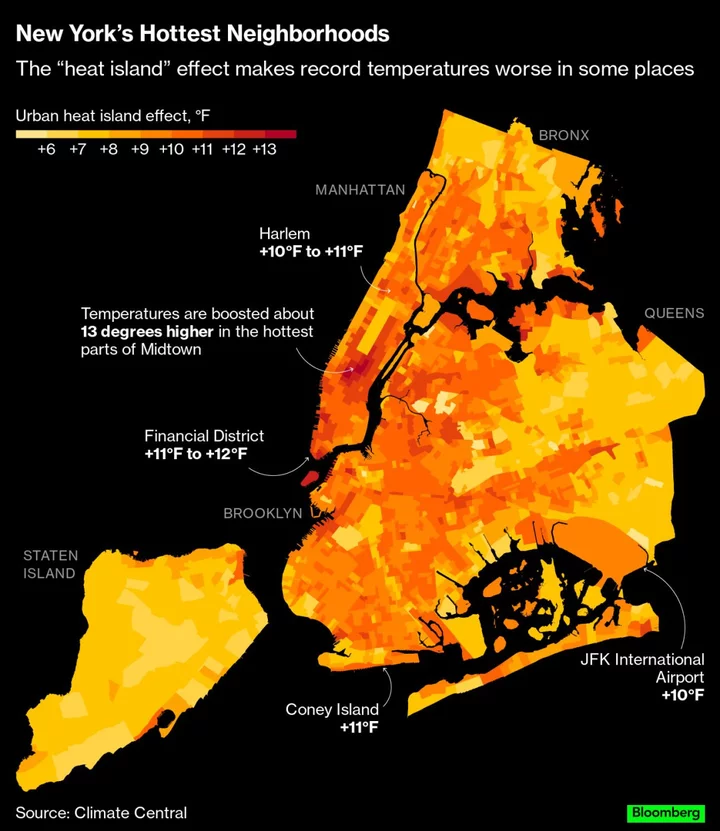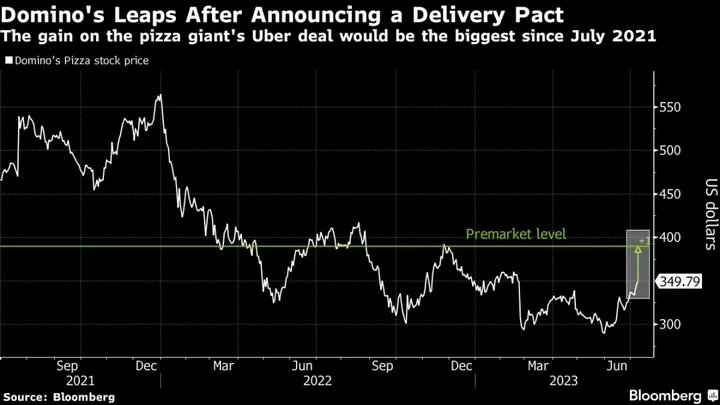Hello, it’s been a scorching week, both literally and in markets. Here’s something to help you catch up while you try and cool off.
Markets are red-hot, with everyone piling into stocks, quants ramping up bond shorts and junk-bond spreads narrowing. Data showing the US economy is thriving as the Federal Reserve beats down inflation has sent the S&P 500 to the brink of its sixth advance in seven months and pushed prices in the Nasdaq 100 to almost 35 times profit. It’s manna for bulls — while also leaving them with precious little wiggle room should anything in the economy or monetary policy not unfold as hoped. Expectations the Fed’s monetary tightening-campaign is nearing an end has also driven bets for a softening dollar, a trend that could boost profit growth for nearly half of the companies on the S&P 500 Index over the next year.
Mortgage rates are over 7%, and affording the record $243,000 price tag on the average entry-level home in the US is increasingly out of reach for first-time buyers — and that’s if a starter home can even be found. First-time homebuyers must now earn $64,500 a year to ensure the cost of an average entry-level home doesn’t exceed 30% of their income, according to real estate brokerage Redfin. That’s up from $57,222 a year ago.
Dockworkers on Canada’s west coast raised the possibility of renewed labor disruptions at the nation’s busiest port after turning down a proposed contract that would have raised wages by 19.2% over four years. One option to end the impasse: Prime Minister Justin Trudeau could recall parliament, currently on summer break, to pass legislation requiring workers stay on the job.
Meanwhile, bitcoin is roaring back after a year of industry scandals and losses. Mike Novogratz, CEO of Galaxy Digital Holdings, talks about the outlook for the industry with David Rubenstein and says the conversion of a single person (BlackRock’s Larry Fink) is enough reason to stay bullish.
Other financial professionals are seeking out a different kind of heat. Jonny Fine, who heads investment-grade debt syndication at Goldman Sachs, starred this week in an episode of Outchef’d, a show where home cooks find themselves duking it out with world-class chefs to deliver the best dish. Unfortunately, it got a little too hot in the kitchen for Fine: His seared duck breast with kecap manis sauce and green beans failed to get any votes, and he lost to celebrity chef and restaurateur Tiffani Faison’s roasted duck breast with spicy duck fat and a ginger sweet potato puree.
With temperatures hovering around or above 100F in many cities across the US, you won’t be surprised to learn that 2023 is likely to replace 2016 as the hottest ever. The bad news is, we’re not yet halfway to Peak Heat, according to Eric Roston and John Ainger, who lay out the supercharged climate solutions needed to cool down our overheating planet in their Big Take. In the short term, even within the same city, some neighborhoods are likely to feel hotter than others so you might do well to avoid those areas if you can.
Across the Atlantic, the weather isn’t any cooler but that hasn’t deterred many tourists from flocking to Europe. Tourism in countries from Spain to France have bounced back furiously from the pandemic, while the record heat is now boosting the attractiveness of the Nordics. That’s leaving the US trailing in both arrivals and spending, and the travel industry isn’t expected to recover to 2019 levels until 2025. For the first time in history, the country is also running a multiyear travel deficit: Americans are spending more money abroad on their travels than international tourists are spending in the US.
And finally, how hot is too hot for the human body? Extreme heat — combined with humidity — is testing the limits of the human body and Elina Ganatra explains the measure of “ wet bulb temperature” and how it impacts individuals’ ability to survive severe heat waves.
Enjoy the rest of your Saturday. We’ll be back tomorrow with a look-ahead to the coming week.









